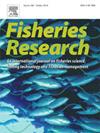Overview of the Ecosystem-Based Fisheries Management (EBFM) workshop at the International Conference on lobster and crab fisheries in 2023
IF 2.2
2区 农林科学
Q2 FISHERIES
引用次数: 0
Abstract
While the need for ecosystem-based fisheries management (EBFM) has been long recognised, the escalating demands and serious threats that climate change poses to our marine ecosystems and the industries and human societies that depend on them, have increased the urgency for its adoption. Given this importance, EBFM was the overarching theme of the 5-day International Lobster and Crab conference held during October 2023 in Western Australia which included a special EBFM workshop that examined the following five concepts: species sustainability, ecosystem sustainability, economic outcomes, social amenity and social impacts. The workshop presentations covered the breadth of EBFM issues including the ecosystem effects of fishing, social, economic, environmental impacts and climate change, bycatch, governance issues in addition to the management of targeted lobster and crab stocks. The major outcomes and conclusions for fisheries management policy identified during the workshop included: (a) the need to take a ‘whole-of-resource’ approach rather than focusing on the effect of a particular fishery; (b) explicit recognition of socio-economic objectives in harvest strategies; (c) incorporating climate change within fisheries management systems; (d) assessment of stationarity assumptions in biological parameters; (e) recognising that regime shifts can result in major shifts in abundance and distribution of stocks; (f) importance of proper governance and compliance in fisheries management; (g) minimising fisheries interactions with protected species; (h) importance of long-term fishery-independent surveys for target species and ecosystem issues; (i) recovery of lost fishing gear; (j) recognition of spatial processes in the management of fisheries and the formation of marine protected areas; (k) importance of considering traditional knowledge alongside western science in fisheries assessment and management; and (l) acknowledging the need for ecosystem-based management which also takes into account the non-fisheries sectors competing for the same spatial area of the resource.
2023年国际龙虾和螃蟹渔业会议上基于生态系统的渔业管理(EBFM)研讨会概述
虽然人们早就认识到对基于生态系统的渔业管理(EBFM)的需求,但气候变化对我们的海洋生态系统以及依赖于它们的工业和人类社会造成的不断升级的需求和严重威胁,增加了采用该管理的紧迫性。鉴于这一重要性,EBFM是2023年10月在西澳大利亚举行的为期5天的国际龙虾和螃蟹会议的首要主题,其中包括一个特别的EBFM研讨会,该研讨会审查了以下五个概念:物种可持续性,生态系统可持续性,经济成果,社会舒适度和社会影响。讲习班的专题介绍涵盖了广泛的生态环境管理问题,包括捕鱼的生态系统影响、社会、经济、环境影响和气候变化、副渔获物、除管理目标龙虾和螃蟹种群外的治理问题。讲习班期间确定的渔业管理政策的主要成果和结论包括:(a)需要采取“全部资源”办法,而不是侧重于某一特定渔业的影响;(b)明确承认收获战略中的社会经济目标;(c)将气候变化纳入渔业管理系统;(d)评估生物参数的平稳性假设;(e)认识到制度的变化可能导致种群数量和分布的重大变化;(f)渔业管理中适当治理和合规的重要性;(g)尽量减少渔业与受保护物种的相互作用;(h)对目标物种和生态系统问题进行独立于渔业的长期调查的重要性;(i)找回丢失的渔具;(j)承认渔业管理的空间过程和海洋保护区的形成;(k)在渔业评估和管理中兼顾传统知识和西方科学的重要性;(1)承认需要基于生态系统的管理,同时考虑到竞争同一空间资源区域的非渔业部门。
本文章由计算机程序翻译,如有差异,请以英文原文为准。
求助全文
约1分钟内获得全文
求助全文
来源期刊

Fisheries Research
农林科学-渔业
CiteScore
4.50
自引率
16.70%
发文量
294
审稿时长
15 weeks
期刊介绍:
This journal provides an international forum for the publication of papers in the areas of fisheries science, fishing technology, fisheries management and relevant socio-economics. The scope covers fisheries in salt, brackish and freshwater systems, and all aspects of associated ecology, environmental aspects of fisheries, and economics. Both theoretical and practical papers are acceptable, including laboratory and field experimental studies relevant to fisheries. Papers on the conservation of exploitable living resources are welcome. Review and Viewpoint articles are also published. As the specified areas inevitably impinge on and interrelate with each other, the approach of the journal is multidisciplinary, and authors are encouraged to emphasise the relevance of their own work to that of other disciplines. The journal is intended for fisheries scientists, biological oceanographers, gear technologists, economists, managers, administrators, policy makers and legislators.
 求助内容:
求助内容: 应助结果提醒方式:
应助结果提醒方式:


